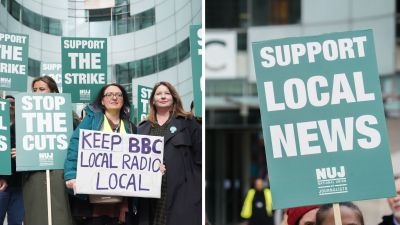BBC staff strike in London to protect 'quality public service journalism'

BBC journalists striking outside Broadcasting House over proposed local radio cuts say they are fighting for "community based public service broadcasting".
The National Union of Journalists (NUJ) said about 1,000 members were expected to walk out across the country today as chancellor Jeremy Hunt delivered his Spring Budget.
It means many 1.30pm and 6.30pm regional TV news programmes across England cannot be broadcast, although they remain unaffected elsewhere in the UK.
About 25 journalists left Broadcasting House in London just after 11am, chanting “save local radio” and “keep local radio local”.
Others held placards reading “stop the cuts” and “save local news”, while one homemade sign read “keep BBC radio local”.
'There’s no logic to many of the decisions': Seamus Dooley of the NUJ explains why BBC journalists are striking
It comes as hundreds of thousands of workers across many sectors go on strike in what could be the biggest walkout since the current wave of industrial action started last year.
Speaking outside the building, Seamus Dooley, assistant general secretary of the NUJ, said journalists were protesting against the "undermining of local radio throughout England".
“We do not believe that eliminating morning programmes and slashing budgets is a sensible strategy, he said.
“The focus now has been on ‘digital first’ – in our view it’s digital first at the expense of quality journalism.
“What the BBC are doing is – on a not very coherent basis – is merging programmes, eliminating some programmes and combining operations.
“But the essence of community broadcasting is being of the community and part of the community. There’s no logic to many of the decisions.
“We recognise that audience changes, but in the fetish towards digital first there is a setting aside of the fundamental need for easily accessible, affordable, quality journalism."
Mr Dooley urged the BBC not to "throw the baby out with the bathwater" by ignoring the "democratic importance" of local radio in pursuit for pageviews.
“There is a tendency - we’ve had this in regional print as well - to look at news based on audience share, determined by hits and algorithms, but actually that’s not why we have public service broadcasting.
“Public service broadcasting is about meeting a basic need, and algorithms should never be king.
He added: “What we are saying is we need a strategic vision which embraces the best of technology.
"Let’s not fetishise about the platform, the important thing here is the actual value of journalism."
Also stood on the picket line outside Broadcasting House was former Labour shadow chancellor John McDonnell - secretary of the NUJ cross-party parliamentary group.
He said: "These workers have been forced to strike and this isn’t about pay or anything like this. This is about maintaining their professional standards in the BBC and local journalism.
“We’ve got to get across to the BBC itself just how important this is because as soon as you start undermining one of the foundations of public service broadcasting like this, the whole edifice of the BBC comes under challenge.
“So these workers have been forced – they’ve tried every other negotiation with the BBC to make them see sense.”
NUJ national broadcasting organiser Paul Siegert added: “I don’t think we’re at the stage where we’re calling on Tim Davie to resign yet.
“But I think faith in him is certainly at an all-time low and he needs to work hard to rebuild that faith over the coming weeks and months.”
He said the recent suspension and reinstatement of presenter Gary Lineker over tweets criticising the government's policy on Channel crossings showed that "the management are out of touch".
He added that BBC staff are “resigned to the long haul” and that “if we can’t get back around the negotiating table” the union would talk about other strike dates.
These include local election results day on May 5, “when local radio plays a massive part in explaining the results and being at counts across the country”, and the King’s coronation on May 6.
The action comes in response to the BBC’s proposal in October that local radio stations share more content and broadcast less programming unique to their areas.
This would see local programming restricted after 2pm and afternoon programmes across England shared between its 39 local radio stations.
Green Party peer Jenny Jones explains why she joined the picket line in solidarity with striking BBC journalists
The NUJ previously said the plans would lead to a loss of posts and journalists having to re-apply for their own jobs.
Under the proposals, the broadcaster previously confirmed 48 jobs would be lost across local staffing in England.
In a blog post on Wednesday, Jason Horton, director of production for BBC Local, said: “We have assured teams working across our 39 BBC Local bases that we are maintaining overall investment and staffing levels in local services and we’re working hard to minimise the risk of compulsory redundancies.
“But change is essential. If our local services are to remain relevant in an increasingly online and on-demand world of live and increasing on-demand services, we must change.”
A BBC spokesman said the broadcaster had “tried to minimise disruption as much as possible”.
He added: “We are obviously disappointed that the strike has gone ahead. We have a plan to modernise local services across England, including more news journalists and a stronger local online service, which will see no overall reduction in staffing levels or local funding.
“Our goal is a local service across TV, radio and online that delivers even greater value to communities.
“We will continue to engage with the trade union and do everything possible to minimise the impact on staff.”
Want a quick and expert briefing on the biggest news stories? Listen to our latest podcasts to find out What You Need To know